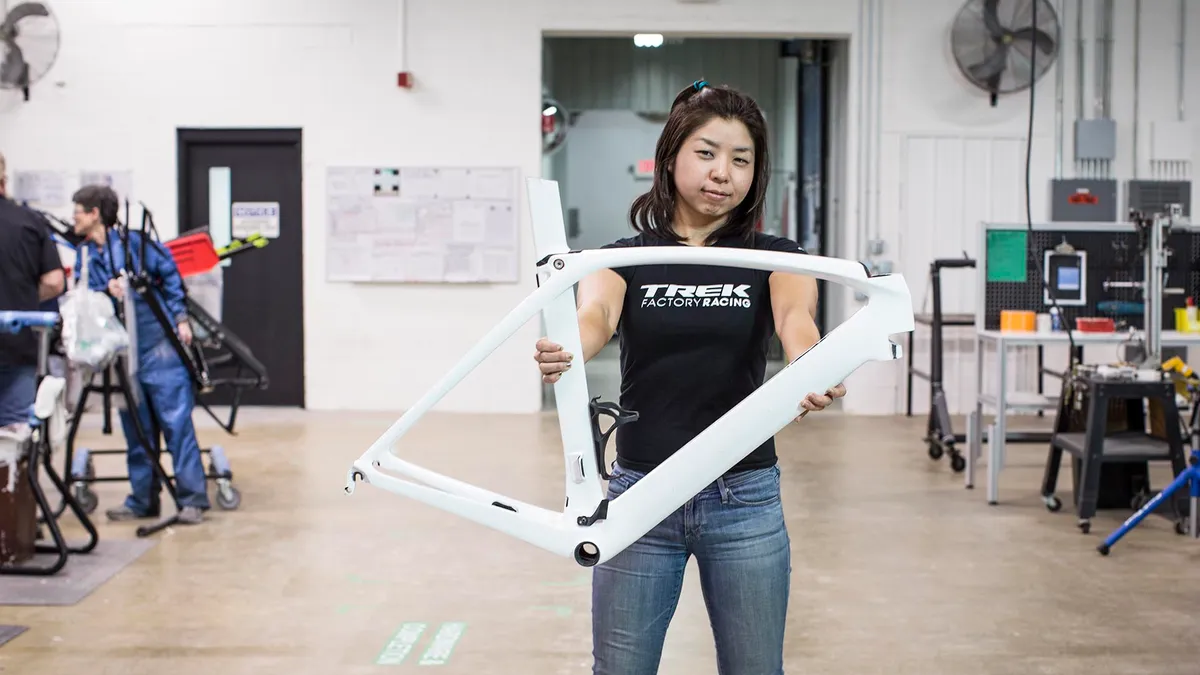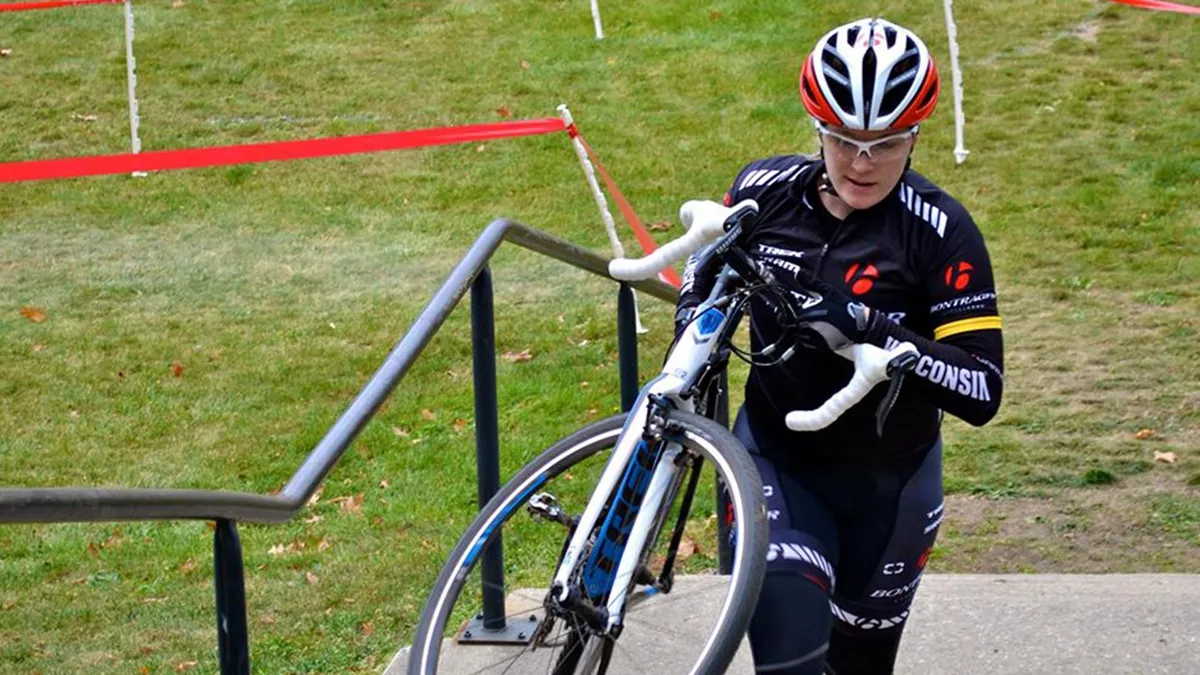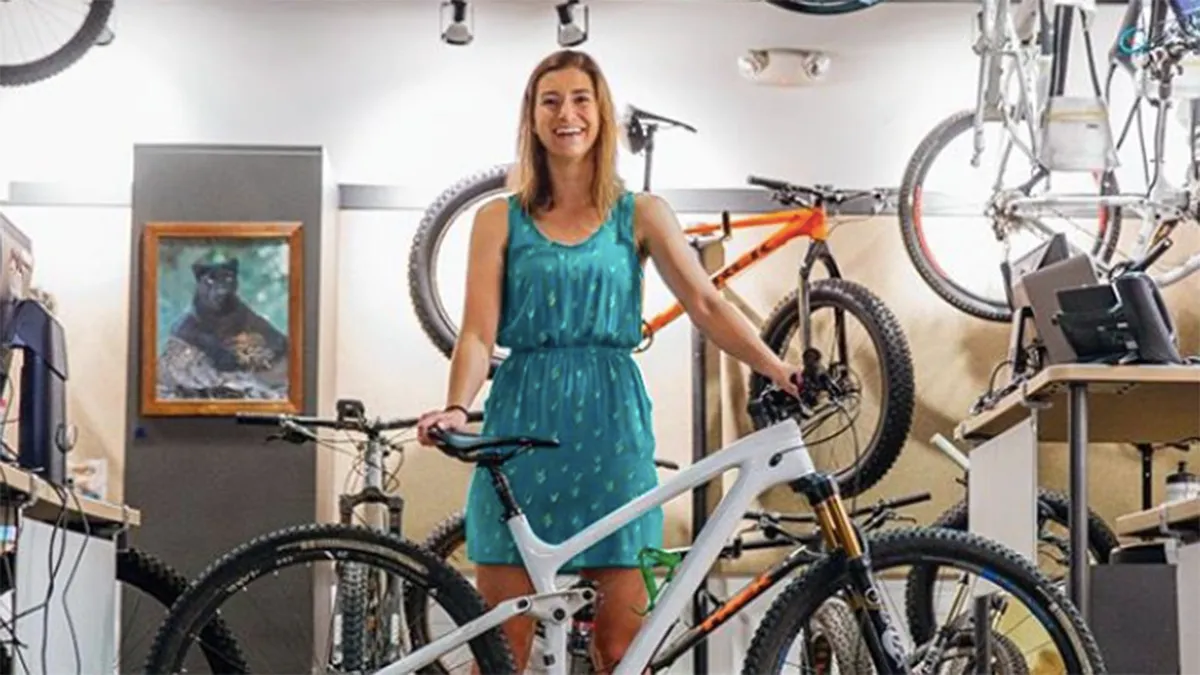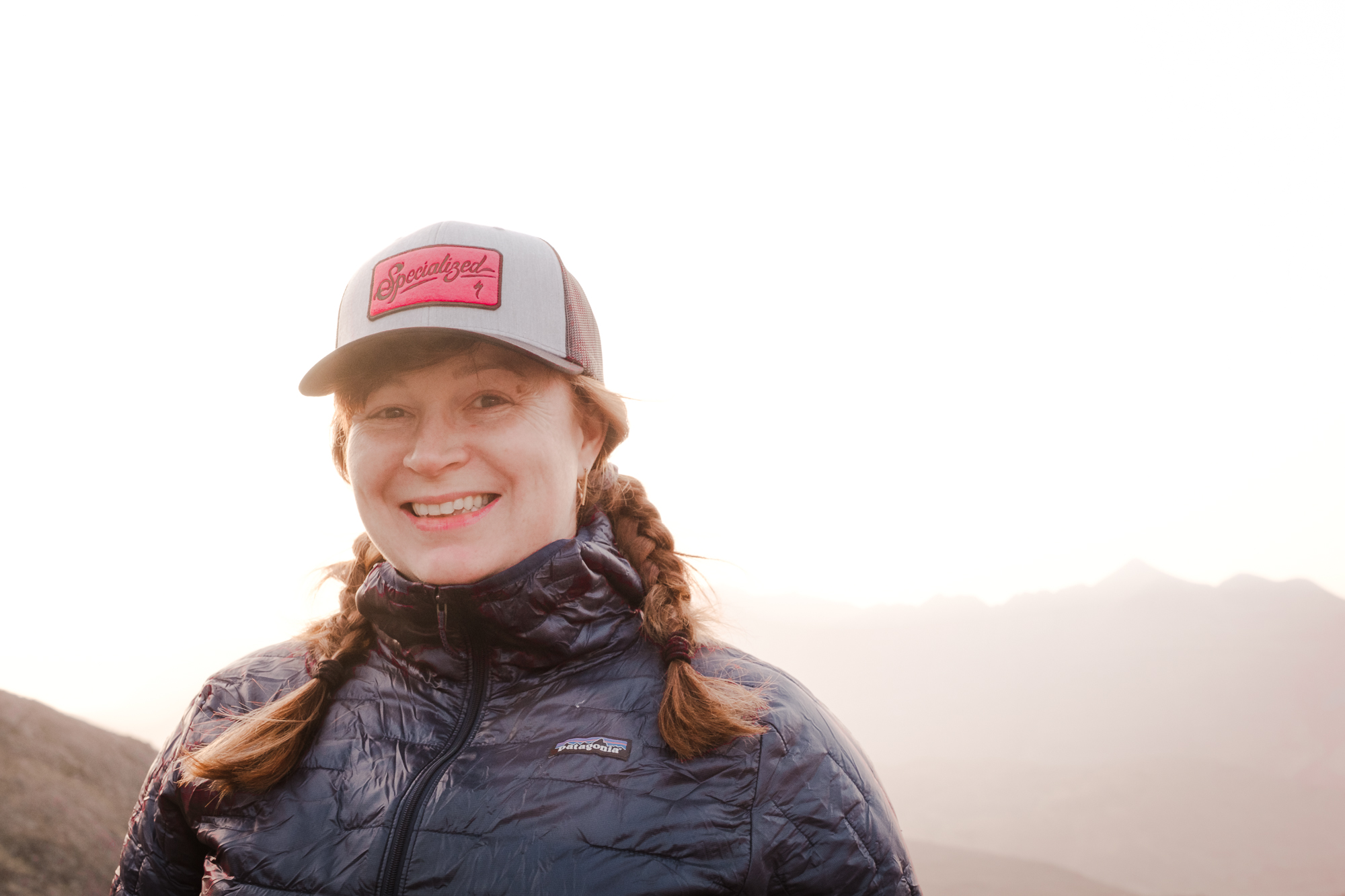Things are changing in the bike industry. Ever-increasing numbers of women are bringing their expertise and experience to a variety of roles. Some are behind the scenes, some in the public eye, but all of them are blazing a trail not only for other women within the industry, but also in how the cycling industry itself caters to women riders.
We spoke to three women holding key roles at Trek about how they're making their mark. We asked them for their views on the changing world of cycling, and their hopes for the future.
Mio Suzuki, Aerodynamics Analysis Engineer, Trek
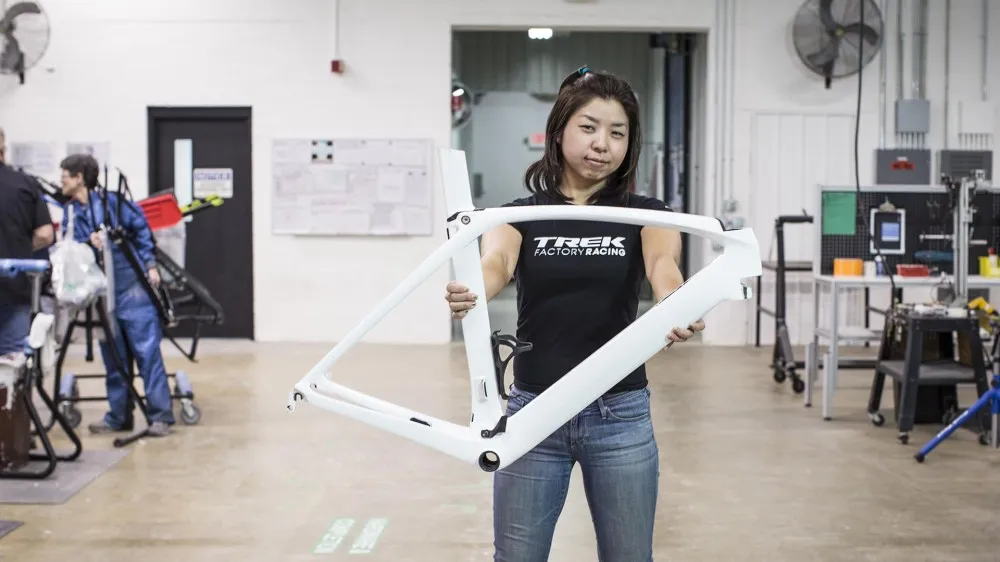
"I’m responsible for providing data and insights on aerodynamics of cycling, including elements like helmets and wheels. My two main tasks are running computational analysis (Computational Fluid Dynamics, CFD) to virtually optimise designs, and coordinating wind tunnel tests to test physical prototypes.
"My portion of analysis figures out how to make the top riders go even faster. Typically, my analysis results are combined with the structural analysis, lots of fine detailed engineering, and industrial designing efforts to make a final product."
What is your background and how did you come to work at Trek?
"I have a master’s degree in Engineering Physics. I double majored in chemical engineering and nuclear engineering with research focus on fluid dynamics for my undergraduate study. After completing the master’s program, a close friend of mine recommended I go visit Trek while I was looking for a job. She had worked at Trek previously, and knew that my interest in cycling and engineering might be a good fit – she knows me a lot more than I know myself!
"I joined the Wednesday public tour at Trek’s headquarter in Waterloo, WI, and fell in love with the fast-paced working environment that I saw. Toward the end of the tour, the guide talked about a group of engineers who do impressive aerodynamics R&D (this was after the first generation Speed Concept was just launched). After hearing him talk, I was determined to find more about the engineering that they do, and I thought I could add further value based on my academic background."
How did you get into cycling?
"My mother was one of very few women in her neighbourhood in Tokyo, Japan, who rode a road bike with drop handlebars. As a kid, I was always following her on the streets on my hybrid bike, and when I became tall enough, I started riding her bike. I was introduced to more serious road biking during my college years through a friend of mine.
"I still use the first road bike I ever bought on my trainer during winter - the 9 speed Shimano Ultegra still shifts great! Since then I’ve been riding whenever time allows, mainly on a road bike. After I started working at Trek, the number of bikes in my basement and the variety of bike rides I do have steadily increased, and this year, I’m looking forward to my first half-iron distance triathlon."
The bike industry has traditionally had a very male-dominated workforce. Do you think this is changing?
"Yes, traditionally, but I do think it’s changing. At Trek, I’m fortunate to be surrounded by so many strong women at all levels of the organisation. It is inspiring to see female leaders who are in charge of major business units at Trek. If this is not yet an industry-wide trend, then I feel empowered to be among those who are leading the effort.
"It is the twenty-first century. There are plenty of well-educated and motivated women with all sorts of professional qualifications who are ready to bring substantial contributions to the table. If certain businesses are not ready to capitalise on these talents, then I would say that’s a big loss on their part.
"If women are under-represented among the workforce, and in ridership, what does that really mean? To me, that sounds like a huge opportunity in multiple aspects. I think about the potential economic gain for the business/industry considering the purchasing power of modern women. I think about the additional room for innovation that can solve problems for female riders when there are specific needs from their riding communities.
"Just thinking about opportunity to enrich someone’s life by bringing the joy of riding to new riders (both female and male) is a thrilling thought. So knowing that immense amount of potential, wouldn’t you want to hire women who understand these riders’ concerns firsthand?"
Do you think more could be done to encourage women into the industry?
"Yes, in so many ways. I’d ask for more exposure plus more support. I would love to see more frequent full recognition of the incredible drive and determination each woman brings to the industry in many different forms. If their efforts are always hidden behind the scenes, how would the world know what women could achieve in the industry?
"When I say women with drive, I’m including everyone from butt-kicking female racers, entrepreneurs who are opening their own retail spaces, makers who build beautiful frames, women working for manufacturers like Trek, non-profit bike advocates, journalists, photographers, women who are leading local rides, etc. I think the full list would be miles long. I bet if I researched properly, I can easily find enough volume of untold extraordinary stories to write a book or two. Yet, I don’t hear about them often enough. I don’t see their images often enough.
"The other part of the equation is the support. Once a group of women join the industry, I want them to stay, and I want them to grow. I think everyone can chip in to make the environment where women are encouraged to be themselves and realise their full potential. Coming from a science and engineering background where women are a scarcity to begin with, I’ve known what it feels like to be on the receiving end of isolation and exclusion for a long time.
"So when I find friends and coworkers who encourage me to keep up with the can-do attitude, and welcome my presence such that I don’t have to be constantly battling against the world just to be heard, it makes me realise the importance of support structure. A female leader offered me a career advice recently. All we had was a 30-minute conversation, but her generosity did wonders to me. It reminded me that sometimes it doesn’t take much to lift others up."
The theme of International Women's Day 2016 is 'pledge for parity' - what is the one most important thing that needs to be done or to happen for parity within cycling?
"I would say, 'Don’t set expectations on women based on stereotypes.' I don’t need someone else defining who I am because of my gender. I think this is true whether you are a woman or a man. The women I see around me (and the woman I am), are just as ambitious as men, are just as competitive as men, are big gear-heads like men, want to go fast, want to climb strong, and are just as style conscious as their male counterparts.
Internally, I think we all have parts that are sort of ‘dudes’ and ‘dudettes.’ So limiting the services, opportunities, and products based on a preconceived notion of 'What women are supposed to be like' sounds very outdated to me. I pledge to break that barrier, and I hope I can stand shoulder to shoulder with others who have not only already made the 'pledge for parity', but everyday going the extra mile to make the community better for women and for all cyclists."
Emily Bremer, Women’s Marketing Manager, Trek
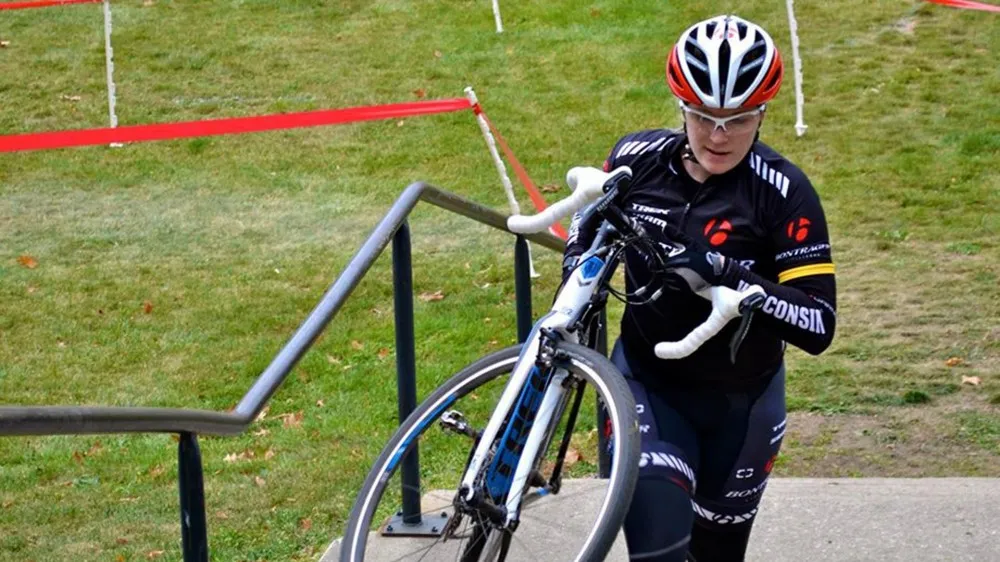
"I’m responsible for all of our consumer-facing women’s marketing across the globe. This includes social media, email campaigns, written content for the trekbikes.com website, and organising and orchestrating photo shoots, to name a few. I focus on making it globally understood that Trek is heavily invested in making this industry an even playing field for women."
What is your background and how did you come to work at Trek?
"I was born and raised just outside of Madison, Wisconsin, just a hop and a skip from Trek Headquarters in Waterloo, Wisconsin. I’ve been surrounded by the Trek brand since before I can remember. Fate had it that I completed my Bachelors of Science at the University of Wisconsin-Madison, in Child Psychology. After spending all my money traveling abroad, I returned to Madison completely broke and homeless.
"I sought refuge in Trek, and was thankfully hired promptly. I began in customer service for almost a year, which opened up an opportunity for me in the marketing department. I’m now enrolled to begin at the Business School at UW-Madison for an MBA starting this fall. Full-time employee meets part-time student should make for an interesting story."
How did you get into cycling?
"It’s a story you often hear: I have two older brothers that never waited for me. Ever. I had to learn to keep up from a very young age, and that included on two wheels. What began as a transportation method in the small town I grew up in slowly turned into a hobby when I started college. I raced for the cycling team at UW-Madison, which I point to as the catalyst to what is now a borderline obsession.
"I do all sorts of riding. I started racing road bikes, which turned into racing cyclocross, which turned into escaping to the mountain bike trails whenever I can. Madison is a really good city to conquer on two wheels, so I have a full fleet of commuter bikes as well. If you count the motorcycle, all in all I own eight bikes. In fact I just re-counted, and the real number is 9."
The bike industry has traditionally had a very male-dominated workforce. Do you think this is changing?
"It is certainly changing, and I think it just took the industry as a whole a while longer to realise it. I think we’re seeing this change happen because brands across the globe are realising the buying potential and influence of female consumers. I’ve seen some brands completely revamp their marketing efforts in order to appeal to women, even at a very basic level.
"Thankfully Trek has seen the potential here since way before my time. This has made it much easier for us to reach these female consumers, and allows us to go above and beyond with our product offering and marketing efforts to reach women worldwide."
Do you think more could be done to encourage women into the industry?
"Yes. Always. This can be said beyond women as well. More can be done industry-wide to bring more people into the sport. Speaking specifically to your question as it relates to women, there is so much room to encourage women to jump on the cycling train.
"This starts with looking outside of our own industry (which starts to feel smaller and smaller by the day). Trek has been working with our entire network of independent retailers to take a hands-on approach to reaching women. We offer demos, group rides lead by women all over the country, tech clinics, you name it. Every little bit helps."
What is the one most important thing that needs to be done or to happen for parity within cycling?
"The industry as a whole needs to realise the potential women have to make our favourite pastime even better. Women want to be taken seriously. We are strong, fast, and get the same amount of enjoyment from cycling as our male counterparts. Once people begin to realise this and take action to embrace it, a pledge for parity will no longer be necessary. Equality will exist on its own."
Jenn Campbell, Design Engineer, Mountain Bike Department, Trek
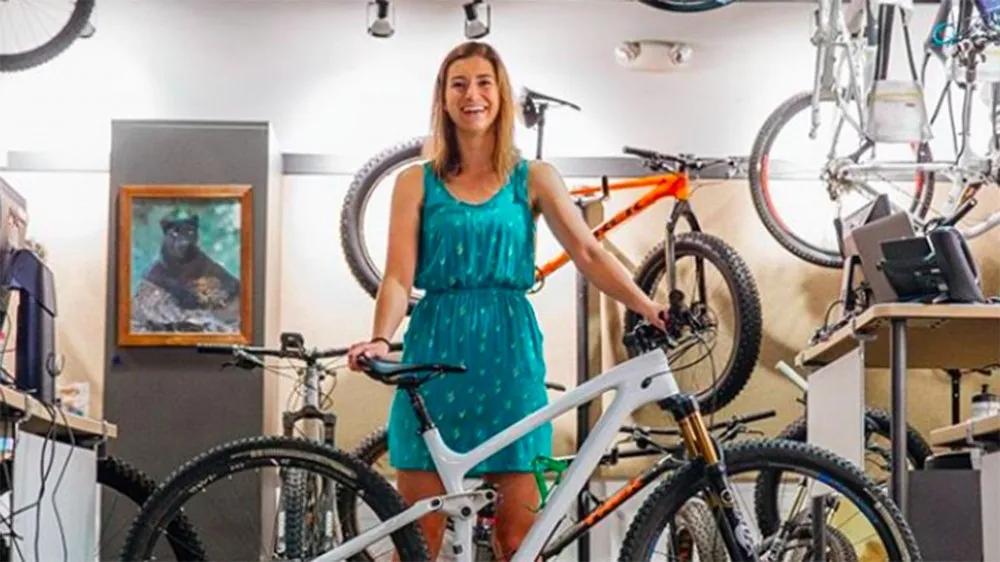
"I design mountain bike frames, focusing on the structure and function of them. This entails collaborating with our analysis engineers to assess potential frame failures and optimise frame design, researching our customers to determine what they want and need in a bike, negotiating product specifications and requirements with both internal employees and international vendors, and working back and forth with our industrial designers to make sure that our bikes kick ass both structurally and aesthetically."
What is your background and how did you come to work at Trek?
"I have a bachelor’s degree in mechanical engineering, and another in political science, both from the University of Notre Dame. I decided that I really loved bicycles and airplanes and figured that I wasn’t going to do anything with either of those with a political science degree, so I switched to mechanical engineering. I kept the political science degree because Notre Dame has a five-year engineering/liberal arts dual degree program. It’s definitely a unique combination!
"I grew up in a bike shop – my grandfather owned up to 13 shops at one point in the 70’s – so I loved being around bikes. I picked up road biking the summer after my junior year once track season was over, and absolutely fell in love. When I went to college, I wanted to do something to stay active, so I joined the cycling team at Notre Dame, and started racing.
"One of my teammates graduated with a mechanical engineering degree and managed to land a job at Trek, so when I switched into engineering, I contacted him about potential internships. He got me in touch with his engineering manager, whom I emailed back and forth for several months. It turned out we had a collegiate race at UW Madison that spring, so I asked if I could swing by Trek. They set up a bunch of interviews for me, and I ended up interning in the Bontrager accessories group both that summer and the following summer.
"I was lucky enough to land a full-time job as a Design Engineer for Bontrager saddles & grips once I graduated from college, and I’ve been with Trek since! It was and still is definitely a dream job for me considering that I essentially changed majors with the hope of working at a bike company, so I’m super grateful that it has all worked out!"
The bike industry has traditionally had a very male-dominated workforce. Do you think this is changing?
"I think that QBP’s women’s bike mechanic scholarship program helps with this. I also think just seeing women ride bikes in every discipline – commuting, road racing, mountain biking, cyclocross – also helps. I’m super stoked about Trek’s new UCI women’s road racing team, because the more awesome women we can support in the sport of cycling, the better.
"It’s also been really exciting to see how women’s professional racing has been getting more attention thanks to the hard work of many racers. It’s great that the highest levels of the sport are taking steps to make women’s cycling more on par with men’s – having a women’s race at the Tour de France, the new Women’s World Tour, etc. It’s putting the sport on track for success in the future."
What is the one most important thing that needs happen for parity within cycling?
"This is the toughest question yet! One thing for parity in cycling. I’m going to have to go with get more women riding bikes at a young age, and develop a love for cycling that they'll have forever.
"I think there are things that the bike industry can learn from the field of engineering. Programs like “Girls Who Code” and toys like “Goldiblox” are a great step in the right direction for the field of engineering. I think by getting young girls involved in engineering type activities at a younger age, you eliminate these self-imposed stereotypes that emerge as they grow up and decide upon a major or a career.
"For both engineering and cycling, it makes the fields less intimidating and they stick with it, then these young girls see older girls and women in cycling or engineering and it actually occurs to them to join cycling or engineering, which may have been something they never would have even considered in the past just because they didn’t see females doing it."
What obstacles do you think there still are for women's cycling? Let us know in the comments below.
